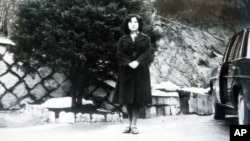American experts on northeast Asia say North Korea’s abduction program in the 1970s, which targeted thousands of South Koreans and Japanese, was a way for Pyongyang to address its depletion of intellectuals and visionaries.
Robert Boynton, director of New York University’s Literary Reportage Concentration, discussed the historical context of Pyongyang’s systematic abductions Wednesday at the Washington-based think tank Korea Economic Institute.
“I discovered the story was stranger than I had imagined,” Boynton said.
The veteran journalist has been following the issue since 2002, when five abducted Japanese returned home. They had spent decades in the North’s so-called Invitation Only Zone, where foreigners who had either been kidnapped or come voluntarily to the communist country resided.
The North abducted an estimated 3,800 South Koreans and more than a dozen Japanese nationals in the late 1970s.
Famed South Korean film director Shin Sang-ok and his actress wife, Choi Eun-hee, are the most well-known examples of the North’s kidnapping for talents the communist country lacked. The couple was abducted in 1978 by then-leader Kim Il Sung. After two failed attempts, the pair escaped in 1986 while on a trip to Vienna, Austria.
In a secretly recorded dialogue with Shin, the enigmatic Kim lamented that he was grappling with the dilemma of teaching North Korean filmmakers new techniques and skills when he could not send them farther than Eastern Europe.
Voluntary returns
In addition to abduction, Pyongyang actively encouraged ethnic Koreans in Japan to return to the motherland.
What ethnic Koreans endured in Japan after World War ll sometimes prompted them to return to North Korea, said Kathy Moon, chair of Korea studies at the Brookings Institution, a Washington research-and-policy group. They are referred to as Zainichi in Japan, which means “foreign resident,” despite being born and raised there for generations.
Sheila Smith, senior fellow in Japanese studies at the Council on Foreign Relations, emphasized the importance of creating a level of activism in Japanese society around the abductee issue. “There has been a long debate since then about the inability or the unwillingness of the government to really take this issue seriously,” she said.
For years, the Japanese public had dismissed rumors of abductions as right-wing conspiracy theories, Smith said. “Maybe an alien abduction is a close parallel.”
When the five abductees returned to Japanese soil in 2002, Smith said there was an awakening of Japanese popular consciousness about the behavior and threat of the North.
The Japanese government recognizes only that 17 of its citizens were abducted by North Korean agents during the six years beginning with 1977. The North, for its part, officially admitted abducting 13 Japanese citizens.
Some historians claim there may have been hundreds of victims from the coastal regions of Japan.














